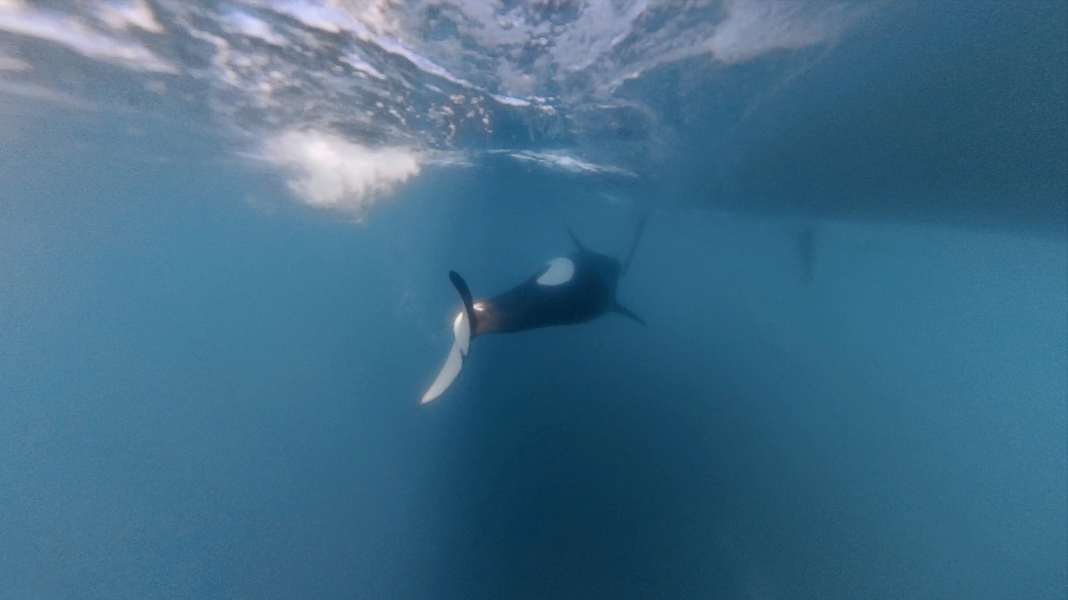
This mostly affects long-distance sailors. So it's no wonder that questions from German blue water crews are often answered by Trans Ocean (TO) landen, the association of German offshore sailors. Bert Frisch, organiser of the online seminars on long-distance sailing topics, has been working on the subject for four years. He provides an insight into the current debate and the controversial defence measures.
YACHT: Mr Frisch, there are few topics that concern sailors in the region as much as orcas. How would you proceed if you wanted to sail along the Iberian west coast or the Strait of Gibraltar - preventively and in the event of an attack?
Bert Frisch: I would buy a whale pal and tow it behind me. This is a pinger that sends a warning signal to the animals. The technology was developed by Heikendorf marine biologist and professor Dr Boris Culik. However, our cutter 'Heimkehr' is a special, very stable boat. I'm afraid that if an orca bites the rudder, it will have to go to the dentist afterwards.
Would you stay within the 20 metre depth line when choosing a route, as is often recommended?
No, especially not at night. There are also gillnets there. I would take the normal course, further out. There are too many dangers from the coast for me.
Some crews are now considering alternative options for the passage of the Portuguese Atlantic coast. Have you noticed at Trans Ocean that long-distance sailors are changing their routes or even plans because of the orcas?
Yes, that's the case. I recently spoke to a sailor who wants to sail to the Mediterranean and is now choosing the Canal du Midi as his route from the Bay of Biscay. The orcas are a risk and scary, unfortunately.
How great is the risk really? There are statements that for every hundred yachts that pass through the area, around two are damaged. Is that even true?
Unfortunately, there are no reliable statistics. But a glance at the AIS portal Marinetraffic is enough to see how many yachts are sailing there. So thousands are not attacked. A huge percentage get away scot-free.
Nevertheless, the number of incidents seems to have increased recently. Is it deceptive, or is the number of serious accidents increasing again after a phase of seemingly declining incidents?
That's my impression, but it's not proven. Trans Ocean has around 2,500 ships in operation, and we keep getting feedback from them. I don't have the impression that the number has increased significantly. But the problem is being publicised more and more. Many crews are very afraid of it, and I would like to allay their fears. As I said, my personal opinion is that a whale pal is an effective and at the same time harmless method. There are now many positive testimonials about it. The frequency with which the device works is tuned to the Iberian orcas.
A number of other defence measures are being discussed among sailors, some of which seem questionable and more like desperate attempts to ward off the whales. What do you think?
People invent all sorts of things. Some things go a bit far, such as the suggestion to screw spikes to the rudder blade. The discussion boils over, comparable to that about attacks by wolves on land. Nonsense is Speculation about the colour of the antifouling. Or the proposal Dumping sand or diesel into the water. I would not recommend much of what is being discussed because it is cruelty to animals. In the beginning it was said that you should switch off everything, engine and echo sounder, and 'play dead'. Now it's the same: Put the lever on the table and drive away. Make some noise. This is supposed to scare the animals off. There are also other examples of this.
What are they?
There was once an oil spill in Alaska, after which whales were to be kept away from the affected bay. Steel pipes were hung in the water and hammered to make noise underwater and scare the animals away. It worked.
Much of what sailing crews are now doing to defend themselves are only short-term self-defence measures - what could really help to solve the problem?
It would be good if scientists could find out why the animals do this. That would be the basis for further steps.
Further information: On orcas.pt there is a map with current incidents and tips on behaviour. Whale encounters can also be reported there. On orcaiberica.org there is also orca news, background information and a map.

